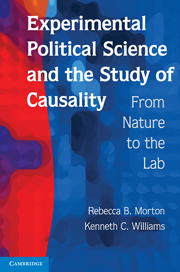1 - The Advent of Experimental Political Science
Published online by Cambridge University Press: 05 June 2012
Summary
The Increase in Experimentation in Political Science
In some sense every empirical researcher is reporting the results of an experiment. Every researcher who behaves as if an exogenous variable varies independently of an error term effectively views their data as coming from an experiment. In some cases this belief is a matter of a priori judgement; in some cases it is based on auxiliary evidence and inference; and in some cases it is built into the design of the data collection process.
(Harrison and List, 2004, p. 1009)Increasingly, political scientists are thinking about their empirical research as in the quotation from Harrison and List, using the terms experiment or experimental to describe their approach or the reasoning behind their choices. In the coming chapters we explore in depth what researchers often mean when they use these terms (which varies depending on the researcher's perspective) and our own definitions of these terms. But before undertaking that task, which is more complicated than some readers might expect, it is noteworthy that the increasing use of these terms to describe a study, although somewhat ambiguous in meaning, suggests that a significant change in perspective in the discipline of political science is occurring. Until the past decade, experimentation seemed to have a low standing within the discipline. For example, McDermott (2002) surveyed a set of political science, psychology, and economics journals and found only 105 experimental articles by political scientists she labels as “established” from 1926 to 2000, with only 57 of these in political science journals.
Information
- Type
- Chapter
- Information
- Experimental Political Science and the Study of CausalityFrom Nature to the Lab, pp. 3 - 28Publisher: Cambridge University PressPrint publication year: 2010
